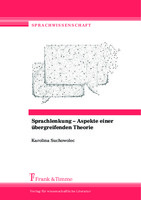Sprachlenkung
Aspekte einer übergreifenden Theorie
| dc.contributor.author | Suchowolec, Karolina | |
| dc.date.accessioned | 2019-11-04 23:55 | |
| dc.date.accessioned | 2020-01-26 03:15:57 | |
| dc.date.accessioned | 2020-04-01T09:55:58Z | |
| dc.date.available | 2020-04-01T09:55:58Z | |
| dc.date.issued | 2017 | |
| dc.identifier | 1005796 | |
| dc.identifier | OCN: 1135846772 | en_US |
| dc.identifier.uri | http://library.oapen.org/handle/20.500.12657/24335 | |
| dc.description.abstract | Is it possible to change the language in a group? And if so, how? In politics and business, conclusive answers to these questions are of great interest. Karolina Suchowolec finds them by analysing the current state of research on language planning, planned languages, controlled languages and terminology work, examining the findings for their possible generalisation and deriving from this language guidance as an overarching linguistic object of research. She has empirically investigated its practical implementation. As a result, she formulates an overview of the challenges of language control as well as the solution approaches postulated in the relevant literature - a solid basis for further theoretical research and support for practical language control. Karolina Suchowolec, *1984, studied Applied Linguistics and German as a Foreign Language in Dresden and earned her doctorate in Linguistics in Hildesheim. As a research assistant at the Institute for German Language in Mannheim, she is involved in terminological and applied linguistic projects. Her research interests include specialist communication, terminology management, controlled languages and knowledge modelling. | |
| dc.language | German | |
| dc.relation.ispartofseries | Sprachwissenschaft | |
| dc.subject.classification | thema EDItEUR::C Language and Linguistics::CF Linguistics::CFB Sociolinguistics | en_US |
| dc.subject.classification | thema EDItEUR::C Language and Linguistics::CF Linguistics::CFD Psycholinguistics and cognitive linguistics | en_US |
| dc.subject.classification | thema EDItEUR::C Language and Linguistics::CF Linguistics::CFG Semantics, discourse analysis, stylistics | en_US |
| dc.subject.classification | thema EDItEUR::G Reference, Information and Interdisciplinary subjects::GT Interdisciplinary studies::GTC Communication studies | en_US |
| dc.subject.other | communication | |
| dc.subject.other | communication optimisation | |
| dc.subject.other | LPLP | |
| dc.subject.other | planned languages | |
| dc.subject.other | language control | |
| dc.subject.other | language guidance | |
| dc.subject.other | language planning | |
| dc.subject.other | terminology | |
| dc.subject.other | terminology work | |
| dc.subject.other | terminology teaching | |
| dc.subject.other | terminology studies | |
| dc.title | Sprachlenkung | |
| dc.title.alternative | Aspekte einer übergreifenden Theorie | |
| dc.type | book | |
| oapen.identifier.doi | 10.26530/OAPEN_1005796 | |
| oapen.relation.isPublishedBy | 68154ca9-944b-46a4-823f-3fb31adbbb48 | |
| oapen.relation.isbn | 9783732995974; 9783732995981 | |
| oapen.series.number | 38 | |
| oapen.pages | 458 | |
| oapen.place.publication | Berlin | |
| oapen.notes | 2019-11-15 19:24:57, DOI: 10.26530/OAPEN_1005796 | |
| oapen.identifier.ocn | 1135846772 |

